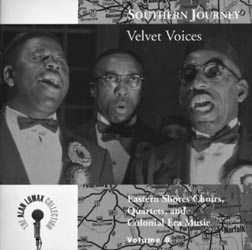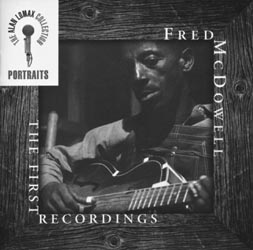
Multifaceted: Rounder Records' extensive Alan Lomax Collection includes the 'Southern Journey,' 'Caribbean Voyage' and 'Portraits' series.
Rounder Records' ambitious Alan Lomax Collection resurrects the pure heart of American folk music
'YOU GOT TO CHECK on your brakes ... check on your lights ... put it in first gear and go on up the hill. Drive on, drive on, children, if I never see you no more, I'll meet you when I pull in on the other shore." No worries on this road: The Bright Light Quartet has got its hands on the wheel of "The Christian Automobile."
Alan Lomax, a musicologist in the employ of the Library of Congress, found the quartet back in 1960 practicing in a wooden church in the tiny hamlet of Weems, Va. The men in the group were all fishermen, and their repertoire ranged from spiritual calls to "reach that golden strand" to bawdy fishing songs ("O Evalina, she's got a money 'cumulator ... right 'tween her legs, boy, my Lordy, Lord").
The seamless transition from one to the other shows that along the hard-luck line on Virginia's Atlantic coast, there is no difference between the struggle for dignity on earth (the rhythmic fishing tunes were sung as the heavy, bulging nets were pulled in hand over hand) and the desire to look into the bright shining face of one's maker.
The quartet's lyrics evoke beliefs of mythic richness tempered by the reality of being black and poor in America: "I got a mother in the promised land, I never 'spect to meet her 'til I shake her hand. All of my way do seem so hard."
"The Christian Automobile," "Evalina" and "Promised Land" are just three of the Bright Light Quartet's contributions to Velvet Voices: Eastern Shores Choirs, Quartets, and Colonial Era Music, the newly released eighth volume in the Southern Voices section of Rounder Records' stunning Alan Lomax Collection. Recorded in April and May of 1960, Velvet Voices also features the Silver Leaf Quartet, the Belleville A Cappella Choir and the Peerless Four, as well as Nat Rahmings and Charles Barnett accompanying themselves on homemade instruments and drums.
THE MATERIAL ranges from a moan called "The Titanic" ("God moves on the water, April the 14th day, God moves on the water, everybody had to run and pray") to the swinging "Trouble in My Way" ("[Jesus] gonna take me, said he gonna take me, yeah yeah, an' that ain't all, said he's gonna rock me, rock me, rock me, rock, rock, rock, rock").
All of it--the music, the words, the performances--is amazing beyond belief. The first six volumes of the Lomax Collection and a necessarily but maddeningly teasing sampler CD (listening to it is like trying to deduce all of Bach from one sonata), released early last summer, provided a taste of what Rounder has in mind for this material, which is a set that will eventually comprise more than 100 CDs.
Divided into 10 sections, the collection will cover a spectrum of music literally as wide as the planet, from prison songs recorded in the same yard in Texas where Lomax and his father, John, discovered Leadbelly languishing in a cell, to Scottish and Irish ballads found in fog-bound coastal villages to Andalusian flamenco to the roots of Italian opera.
So far Rounder has released eight volumes of the collection's first segment, Southern Journey, which includes all of the material released in the early 1960s under the same title on 12 hard-to-find Atlantic and Prestige International LPs, plus unreleased recordings. Rounder has also begun to issue CDs from the Caribbean and Portraits segments.
Overestimating the importance of the music is impossible: this is the invisible heart beating in the body of American musical culture. Lomax, first in the company of his father and then on his own, roamed the world for the Library of Congress in search of the roots of the roots of the world's music.
In this era of disposable radio filler, when new pop CDs are sold, consumed and trashed like fast food, it is a gesture of magnanimous generosity that nearly all of Lomax's historic recordings are being made available to the public by Rounder. To be sure, the company will make money from the collection, but not since the heyday of Folkway Records and Arhoolie has so much wondrous music been put on the market just because someone thought it was important we not forget who we are or where we came from.
 ALSO JUST RELEASED is Volume 7 of Southern Journey, titled Ozark Frontier: Ballads and Old-Timey Music from Arkansas, with performances from the likes of Bookmiller Shannon, Absie Morrison, Neil Morris and a maple-voice grandmother named Almeda Riddle, among others. Song titles such as Riddle's "Rainbow 'Mid Life's Willows" and Morris' "The Irish Soldier and the English Lady" remind listeners of the direct connection between many of these songs and the ballads of Elizabethan England. The sweet melodies confirm the lineage.
ALSO JUST RELEASED is Volume 7 of Southern Journey, titled Ozark Frontier: Ballads and Old-Timey Music from Arkansas, with performances from the likes of Bookmiller Shannon, Absie Morrison, Neil Morris and a maple-voice grandmother named Almeda Riddle, among others. Song titles such as Riddle's "Rainbow 'Mid Life's Willows" and Morris' "The Irish Soldier and the English Lady" remind listeners of the direct connection between many of these songs and the ballads of Elizabethan England. The sweet melodies confirm the lineage.
Two of the Caribbean and Portraits CDs have just been released as well: Fred McDowell: The First Recordings, a 14-song album from the famed Mississippi bottleneck guitarist, and Brown Girl in the Ring, a collection of children's game and "pass-play" songs recorded by Lomax in the Caribbean.
The latter ranks as among the most enchanting albums ever. Listening to it is like having a group of happy children singing all day outside the window. Just listing the song titles creates poetry: "Gypsy in the Moonlight," "In a Fine Castle," "I Have a Tree in My Right Hand," "Sandy Girl," "Some Like It Hot, Some Like It Cold," "Green Gravel," "Sammy Dead-O."
While these songs are rooted in distant African melodies and rhythms, several are recognizable. The melody titled "Early in the Morning" was made into "Peanut Vendor" by Louis Armstrong, and most listeners will recall "Tra La La Voumbé" as "Ta Ra Ra Boom De Ay." But in every example, the music is nothing less than utterly charming.
All of the music Rounder has released in the Alan Lomax Collection so far is miles beyond commercial banality. This is quite literally the music of work, play, hope, love and freedom. There is no reason to doubt that everything still to come from the collection will taste of the waters from the same rich well, for this is the pure music of pure human experience--no dollars are attached.
"I found out that what I was really doing, and my father was really doing, was giving an avenue for people to express themselves and tell their side of the story," said Alan Lomax, who is now in his 80s, back in 1991. He could have easily said "poor people," for if one quality unites all of the musicians recorded across the world by Alan and John Lomax, it is their low means.
Just look at the photographs in the booklets accompanying the CDs. There's not a car or a lawn or a mall to be seen. It is no coincidence that at the same time the Lomaxes were recording Okie ballads and traveling songs from Dust Bowl migrants, John Steinbeck was writing their story in The Grapes of Wrath. This atmosphere, where nobility rises from difficulty like vapors from a cauldron, is all but forgotten now in popular music except by, it seems, Bruce Springsteen. If we're lucky, the Alan Lomax Collection will make us remember true nobility again.
[ Metro | Metroactive Central | Archives ]
![[Metroactive Music]](/music/gifs/music468.gif)